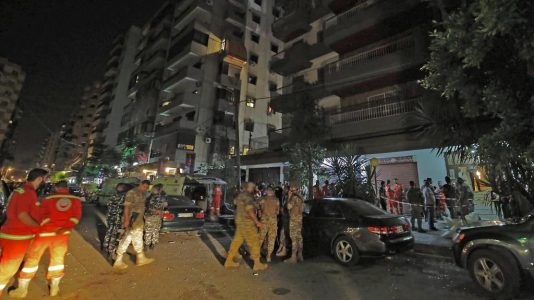
Lebanon gripped by night of terror as terrorist attacks Tripoli
A former ISIS fighter killed two Lebanese soldiers and two police officers late on Monday evening during a shootout in the northern city of Tripoli before detonating an explosive belt when cornered by security forces.
Interior Minister Raya El Hassan confirmed the death toll and said the security forces were taking all precautions to prevent further attacks.
“Tripoli today was supposed to be celebrating Eid Al Fitr, but unfortunately people experienced a terrifying night,” she told reporters on Tuesday. “The army paid a heavy price for protecting the city.”
Condemning the attack, Ms El Hassan said: “Tripoli succeeded against terrorism yesterday thanks to the co-ordination between the army and the security forces.”
The gunman was named by officials as Abdel-Rahman Mabsout who served a year in prison between 2016 and 2017 for fighting with ISIS in Syria but fled there again after being released.
At around 11pm on Monday night, Mabsout opened fire at the Central Bank in the largely Sunni northern city and shot at a police post near the Tripoli municipal Serail.
Local media reported that Mabsout then drove around the city on a motorcycle, firing on soldiers and police, injuring many. The state-run National News Agency said one of the soldiers was killed when Mabsout opened fire on an army vehicle. A second soldier died from his wounds later, the military announced just before 2am.
The army set up a security cordon and a special unit of the army’s intelligence directorate began searching for Mabsout, tracking him down to some residential buildings. He then detonated a suicide vest during a final stand-off with the military, although the army said that no one else was wounded in the blast.
Before the attack, the military said it had deployed additional forces across the country, especially around places of worship, to ensure security during Eid Al Fitr.
The security situation has been largely stable in Tripoli for the last four years. In the early days of the Syrian war, the largely Sunni Muslim residents of Bab Al Tibbaneh neighbourhood clashed with the mostly Alawite neighbourhood of Jabal Mohsen in a mini-conflict in Tripoli. The two sides fired at each other from across the dividing Syria Street that bisected the communities.
But the army rolled out a security plan in mid-2014 that aimed to put an end to the fighting and round up the instigators. Since then, there have not been widespread clashes in the city.
The underdeveloped metropolis is the country’s second largest city after Beirut, but suffers from under-investment, high unemployment and few prospects. In some of the poorest neighbourhoods, recruiters have found willing volunteers to join hardline groups in Syria.
Monday’s incident is also the first major attack connected to the Syrian conflict in Lebanon since the Fajr Al Jaroud military operation in 2017 on the border to clear militants linked to Al Qaeda and ISIS who were entrenched in a mountainous area. There was a separate operation weeks before that by Hezbollah near Arsal.
The 2017 operation cleared the last Lebanese territory held by militants who had seized it in 2014 when they overran the border town of Arsal but were pushed into the surrounding hills by the military.
Lebanon has faced significant spillover from the neighbouring conflict. As well as hosting well over a million refugees from Syria, it suffered several bouts of instability and numerous terror attacks from 2013 through to early 2015.
There was an effort to secure Lebanon with an international-funded military assistance package. Land border regiments were trained and equippd to help stop explosive-rigged cars and militants freely crossing the rugged border between Lebanon and Syria. Coupled with this was the Hezbollah military campaign to recapture the Qalamoun Mountains on the Syrian side of the border from hardline groups and rebels also created a security buffer – although the pockets around Arsal were still held until the separate Lebanese military and Hezbollah offensives in 2017.
The combined impact, as well as a more stable internal political situation, led to a drop in attacks from Syria and years of stability, although isolated incidents still took place.
Source: The National





